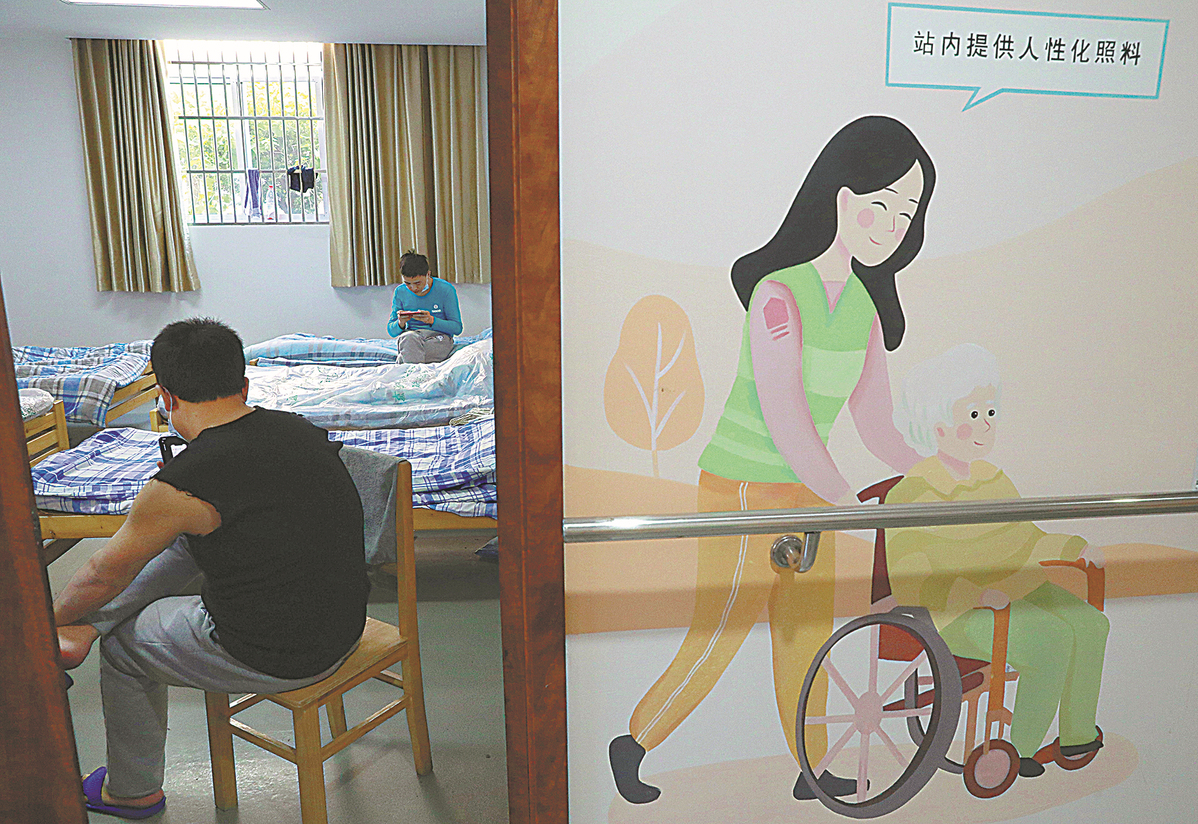Rescue stations provide homeless people safe shelter during outbreak


Thanks to a rescue station, Yao Xiuju has obtained a temporary place to reside in Shanghai amid the epidemic, with a tidy bed, a room for taking a shower and regular daily meals.
The 50-year-old woman was sleeping rough at the door of a shopping mall when she was found by patrolling employees of the rescue station in Shanghai's Yangpu district on the evening of April 1.
Before that, the native from Jinan, Shandong province, had been living without a fixed place for a couple of days due to hotel closures during the latest COVID-19 outbreak.
"I visited Shanghai in early March to deal with some private affairs. But within two weeks, the epidemic hit the city, resulting in many public areas being closed and also bringing difficulties for me in finding accommodation," she recalled.
"I was anxious, helpless and even desperate at that time, since I couldn't contact my family because I had no power in my mobile phone and I didn't know who I could turn to in the city," she said.
"So I'm glad to be here. Besides the shelter, I have food to eat and can also take a shower," she added.
"My health is monitored every day, which makes me feel secure."
On Friday, when China Daily visited the station, some 30 homeless people facing difficulties during the latest outbreak, including Yao, were residing in the four-story, 74-bed building, where they can watch television or play chess. They were being cared for by about 10 social workers.
They are provided with free temporary accommodation and meals after receiving physical checks and nucleic acid tests in a designated hospital, according to Ju Jiading, head of the station.
He said its employees also work with police officers and civil affairs officials to double-check people's identities and help contact relatives or community committees to ensure they can head back home when the epidemic is alleviated.
A woman surnamed Wang, who declined to give her full name, turned to the station on April 8, five days after she'd started sleeping rough at a subway entrance.
"A security guard told me about the rescue center after finding me wandering the streets with two big suitcases, so I came here," said the 54-year-old from Shenyang, Liaoning province.
She is divorced and has worked odd jobs in Shanghai over the past two years, but at the beginning of this year, she was unemployed.
She lost her apartment due to being unable to pay her rent, and has not been able to find a job amid the pandemic.
"The station has given me a buffer during this tough period," she said.
Showing reluctance to go back to her hometown, she added that she will make a living as quickly as she can when Shanghai returns to normal.
While providing temporary accommodation, the station also distributes living supplies, as well as helps people access hospitals and find employment to ensure they can get back on track, said Ju, the station chief.
The station also shelters those who've suffered from domestic violence and provides a special area for looking after homeless children, he added.
News portal Jiemian reported that 18 rescue stations across Shanghai have been placed under closed-loop management since late March, and most have continued running.
If the capacity of the stations is overloaded, subdistrict committees where the stations are located will be asked to offer temporary accommodation for people in need.
Jiemian added that the accommodation service in such stations, in general, is provided within 10 days, but during the epidemic it has taken longer to provide beds, so some stations cannot accommodate those in need.
Last month, Jiang Rui, director of the Civil Affairs Bureau, emphasized at a news briefing that Shanghai authorities should improve care for homeless people facing difficulties during the latest outbreak and cooperate with social welfare agencies to keep them safe.
Those who are homeless can include travelers who do not have a place to reside due to hotel shutdowns, those who used to live in workplaces like construction sites that have been closed due to epidemic prevention measures, and job seekers who are not willing to leave the city at the moment.
- HKSAR chief executive says to conclude residential complex fire probe within 9 months
- Viral scenic valley in China, not Japan, operators of tourist attraction clarify
- European Chamber Shanghai Chapter calls for stronger EU-China sustainability ties
- Former senior official at State Council body under investigation
- CITIC Group deputy general manager sentenced to life
- Qingdao Port integrates clean energy with China's first hydrogen-electric tugboat




































